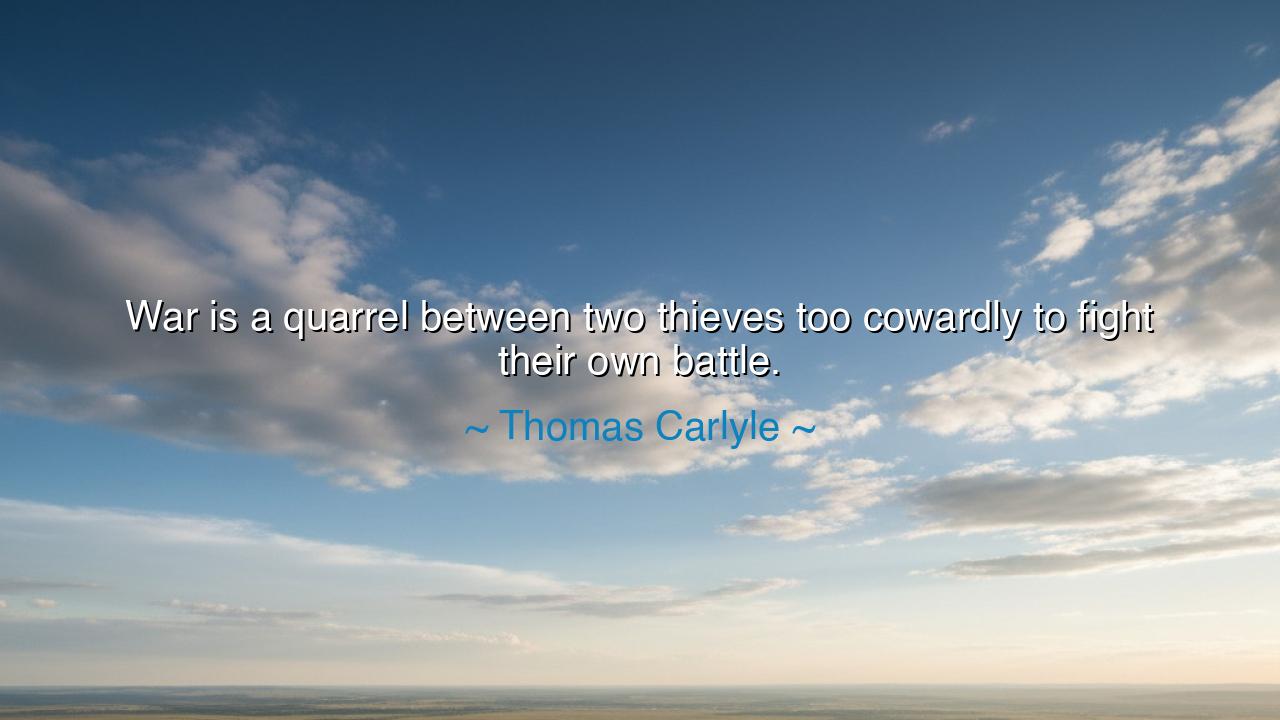
War is a quarrel between two thieves too cowardly to fight their






Hear, O children of history and seekers of truth, the thunderous cry of Thomas Carlyle, who declared: “War is a quarrel between two thieves too cowardly to fight their own battle.” In this searing judgment, he strips war of its false glory and pomp. He names it not the noble clash of heroes, but the sordid dispute of robbers—men who covet what is not theirs, yet lack the courage to shed their own blood for it. Instead, they send the poor, the young, and the innocent to die in their stead.
For what is a thief but one who takes by force what he cannot earn by right? Carlyle saw that many wars are born not of justice but of greed: for land, for gold, for power, for pride. The leaders who declare them are often shielded by distance, their hands clean while their armies bleed. They are thieves who desire gain, and cowards who will not seize it with their own strength, but command others to pay the price. Thus, the battlefield is littered with the bodies of the faithful, while the true quarrel belongs to those who never lift a sword.
History offers us many examples. In the trenches of World War I, millions of young men rotted in mud, choking on gas, torn apart by shells—yet the quarrel began with monarchs and ministers vying for empires and thrones. Those kings did not march with rifles on their shoulders; they sent sons of farmers and clerks, men who never quarreled with one another, to slaughter and be slaughtered. The “thieves” coveted power, but it was the powerless who bore the wounds.
Even in more recent times, we see the same pattern. In the wars of conquest, in the invasions driven by ideology or greed, it is seldom the leaders who fall in the dust of battle. They hide in palaces, speaking of honor and destiny, while families bury their children. Thus Carlyle’s words ring with timeless truth: the cowardice of the powerful turns nations into graves.
Yet Carlyle’s scorn is also a summons to awaken. He warns us not to be deceived by the banners of false glory. When leaders clothe their theft in patriotic colors, when they dress greed as duty, the people must learn to see through the veil. For no war born of theft can bring peace, and no coward’s quarrel can yield honor. To march blindly into such battles is to give one’s life for another man’s lie.
But there is also a deeper call here: that true courage is not found in sending others to fight, but in facing one’s own quarrels directly. In life, as in politics, it is easy to let others suffer for our pride or our desires. Carlyle urges us to act otherwise: to bear our own burdens, to resolve our conflicts with integrity, to fight our own battles without exploiting others.
Therefore, O seekers, remember this lesson: beware of the thieves who clothe themselves in crowns, uniforms, and speeches. Do not mistake their cowardice for courage, nor their theft for justice. And in your own life, strive never to let others pay the price for your quarrels. Be brave enough to carry your own weight, honest enough to seek peace when peace is right, and strong enough to resist those who would make you the pawn of their greed.
So remember Carlyle’s wisdom: “War is a quarrel between two thieves too cowardly to fight their own battle.” Let it guide your sight, sharpen your judgment, and strengthen your resolve. For true courage is not found in sending others to die—it is found in living with honor, and in standing against the cowards who would disguise theft as glory.






Nnhha
I find this perspective brutally honest but incomplete. It condemns the powerful, yet it doesn’t fully address why ordinary people follow them—through nationalism, fear, or loyalty. Are citizens complicit when they allow themselves to be stirred into battle by rhetoric? The quote invites not just political critique but self-examination. Maybe the cowardice Carlyle mentions isn’t only in leaders but in societies that choose comfort over questioning authority.
NTtran ngoc tu
The quote’s starkness reminds me of how language can deflate propaganda. Calling war a quarrel between thieves removes any illusion of nobility. Yet, it also raises a question: can humanity ever escape this pattern? If greed and fear are constant in human nature, perhaps the real challenge is not abolishing war entirely but exposing its false narratives before they take hold. How do societies cultivate skepticism without sliding into cynicism?
BTBinh Thanh
There’s a timeless quality to this critique—it could describe ancient kings, colonial powers, or modern superstates alike. The idea of ‘thieves’ suggests that wars are ultimately about plunder, whether material or ideological. But what about defensive wars or struggles for liberation? Are all wars immoral by this definition? I’d appreciate a discussion on whether Carlyle’s condemnation applies universally or mainly to wars of conquest and ambition.
HGLe thi Huong Giang
This statement provokes moral outrage but also sadness. It paints war as an act of cowardice, yet soldiers—the ones who actually fight—are often courageous individuals caught in systems they can’t control. I wonder if the true cowardice lies in the moral distance between decision-makers and consequences. Would wars still occur if leaders had to stand on the front lines, shoulder to shoulder with those they send into danger?
TTThao Tien
Carlyle’s cynicism here resonates deeply. He reframes war not as a clash of ideals but as organized theft—nations looting resources, land, or influence while disguising motives behind patriotism. It makes me question how often moral language serves as camouflage for economic gain. If most wars begin as disputes over ownership or control, then who are the real thieves: the governments, the corporations, or the ideologies that justify them?